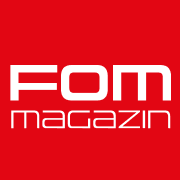Are we more creative in face-to-face meetings? A study claims so. But scientists warn against jumping to conclusions. Instead of bringing employees into the office for creative brainstorming sessions, you should create a creative environment in virtual meetings.
An Editorial of the FOM Magazine
Online meetings have many advantages, but face-to-face meetings are something else, aren't they?
That's what we hear time and time again. But what exactly is the difference between face-to-face and virtual meeting formats?
Researchers at Columbia Business School and Stanford Business School tried to answer this question. Their finding: virtual meetings could inhibit creativity!
Study: Creativity slightly lower in virtual meetings
The researchers conducted a field experiment in which test groups were asked to develop creative ideas for the use of a product in virtual and face-to-face meetings. The face-to-face meetings generated more ideas overall.
However, the effect was small: The test groups usually came up with only one or two more ideas.
The researchers attributed this primarily to the fact that virtual communication focused on a screen. Because of the limited visual focus, the cognitive focus was also limited. This would hinder the creative process. A common assumption is that face-to-face meetings would create an atmosphere of trust, which would improve the creative process. However, the researchers believe this is unlikely. According to their study, such potential social effects would have no impact on the creative process. The problem was primarily the focus on the screen.
Fostering creativity through a hybrid work culture
An intermediate approach is a hybrid meeting culture, where face-to-face meetings are mainly used for creative workshops and other meeting formats are held as virtual meetings.
However, the researchers also point out that potential cognitive disadvantages do not provide a decisive argument against virtual meetings.
While face-to-face meetings do have advantages for the creative process, the cost advantages of virtual meetings, the global
recruiting opportunities, and geographic independence must be factored into the decision for or against virtual meetings.
Other opinions: Fostering creativity through the right meeting formats
Ellen Langer, a professor of psychology at Harvard University, believes the study is a good step toward gaining a better understanding of virtual meetings. However, she warns against jumping to the conclusion that creative meetings cannot also be conducted virtually. According to Langer, whether or not we are creative in virtual meetings is primarily related to the creative skills we possess in the first place. She also points out that there is a difference between thinking about creative ideas for using a Frisbee and thinking about innovative ways to solve complex problems. For example, virtual meetings could include pauses for reflection and perhaps even achieve better results than face-to-face meetings. Jay Olson of McGill University in Canada also says a single study is not enough to bring employees into the office for brainstorming sessions.He also points out that the effect measured in the study is too small to justify the disadvantages of face-to-face meetings, such as the time lost due to travel . If employees had to take up travel time, that could also limit their satisfaction and thus their creativity.
FOMs: Optimizing the Meeting Experience with Best Practices
The scientific debate shows that we are still at the very beginning with our empirical data regarding virtual meetings.
Studies and practical experience will reveal further insights into the strengths and weaknesses of virtual meetings in the coming years and make it possible to continuously improve the digital meeting experience.
This is precisely why meeting management software is so important: it always provides organizations with the latest best practices for their meetings. For example, as Professor Langer suggests, you could build reflection breaks into agenda templates for brainstorming sessions.
Write to us at contact@fom-magazin.de.





